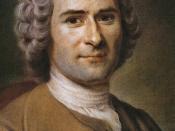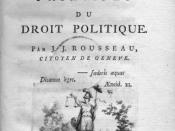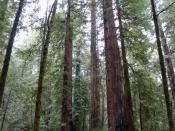The nature of man compels him to seek an environment within which he can reach his optimum level of happiness. Many men throughout history have conceptualized the idyllic society, the utopia, within which mankind lives in peace and contentment, thus fulfilling this desire. Some, such as Thomas More in his Utopia, have seen it necessarily as an artificial construction, built upon a system of law ensuring the rights of and providing for the individual. Others, such as Ovid in his vision of the Golden Age, and more radically Rousseau in his Discourse on the Origins of Inequality, emphasize the uncorrupted man, living before complex society frustrated his existence in harmony with nature. But rather than propose a "retire[ment] to the woods, " Rousseau went on to write The Social Contract, recognizing that if man is to reclaim his past happiness it needs to be through a system of government which ensures that happiness.
I have drawn a map of a utopian society that I discovered in the wilderness of Thought and Idea, at the foot of the mountain Perfection. The nation's founders named it the "State of Nature" because its creation was an attempt to match man's original state of contentment by guaranteeing it within a complex framework of laws and programs. They instituted a central authority, along with a powerful enforcement agency, to control the population and secure the happiness of the whole. This governmental structure, along with the state's carefully designed infrastructure, is what maintains the state to this day.
Understanding the Law is the key to understanding the State of Nature. To protect against abuse or mistreatment of its citizens, the state was founded with a detailed set of laws guaranteeing personal safety and possessions. Also codified were the laws managing state operation and...


